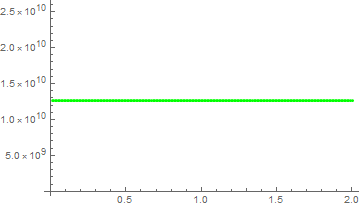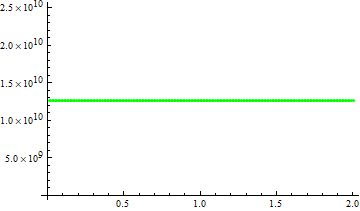Backslide introduced in 11.3, fixed in 12.0.
I've been posting various questions about similar pieces of code all year, so if this looks familiar you may have seen another one of my posts, but this is a unique issue that has not been asked yet, so I am posting it here. Basically I am using a loop so solve a system of coupled differential equations, using those results to change the value of a variable accordingly, then solve the system again, this time with the new value of the variable that was changed, and I want to do this in small steps 200 times, then plot the output. Here is the code:
h2 = {{0, -(Ω/2)}, {-(Ω/2), δ0 + Δ}};
ρ2 = {{ρ11[t], ρ12[t]}, {ρ21[t], ρ22[t]}};
ρdecay = {{1/2*γ*ρ22[t], -γ*ρ12[t]}, {-γ*ρ21[t], -(1/2)*γ*ρ22[t]}};
ρtderiv = -I*(h2.ρ2 - ρ2.h2) + ρdecay;
replace3 = {Δ -> -1*10^9, γ -> 1.6*10^9, Ω -> 1, m -> 10^-25, ℏ -> 1*10^-34, k -> (2 π)/(500*10^-9), v -> 10^3};
txvarray = Table[{0, 0, 0}, 200];
t0 = 0; ρ120 = 0; ρ210 = 0; ρ220 = 0; ρ110 = 1; δ0 = (2 π*10^3)/(500*10^-9);
Do[{ρsol11, ρsol12, ρsol21, ρsol22} = NDSolveValue[{ρ11'[t] == ρtderiv[[1, 1]], ρ12'[t] == ρtderiv[[1, 2]], ρ21'[t] == ρtderiv[[2, 1]], ρ22'[t] == ρtderiv[[2, 2]], ρ11[t0] == ρ110, ρ12[t0] == ρ120, ρ21[t0] == ρ210, ρ22[t0] == ρ220} /. replace3, {ρ11, ρ12, ρ21, ρ22}, {t, t0, t0 + 0.01}, MaxSteps -> Infinity];
Δt = 0.01;
t0 += Δt;
fscatt = ℏ k^2 γ Re[ρsol22[t0]]/m /. replace3;
δ0 -= Δt fscatt;
txvarray[[i, 1]] = t0;
txvarray[[i, 2]] = fscatt;
txvarray[[i, 3]] = δ0;
ρ120 = ρsol12[t0];
ρ210 = ρsol21[t0];
ρ220 = ρsol22[t0];
ρ110 = ρsol11[t0], {i, 1, 200}]
txabs = Table[{txvarray[[i, 1]], Abs[txvarray[[i, 3]]]}, {i, 1, 200}];
ListPlot[txabs, PlotStyle -> Green]
Note the δ0 in the first line, in h2. This is the variable that changes after each iteration (this happens in the line δ0 -= Δt fscatt;). The problem is that whenever I try to run this code, it gets stuck and I have to quit the kernal. Any ideas why this is happening/how to fix it? Thanks!



txvarrayshould betxvarray = Table[{0, 0, 0}, {200}];) though. ) Have youCleared the variables before executing the code? (Especiallyδ0.) Please double check the sample. $\endgroup$Print[]statements to track the progress of evaluation. $\endgroup$